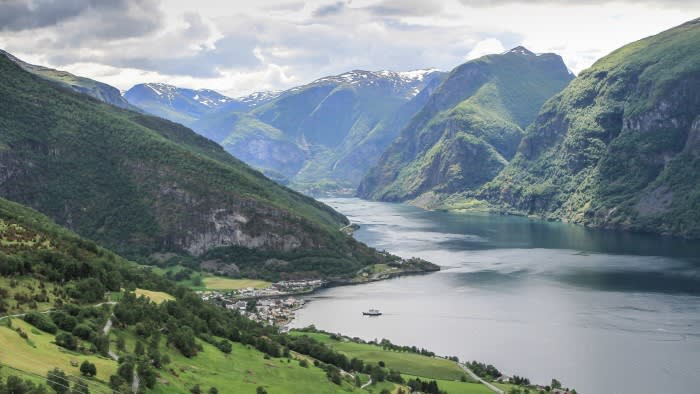Unlock the Editor’s Digest for free
Roula Khalaf, Editor of the FT, selects her favourite stories in this weekly newsletter.
Southern Water, which serves 4.7mn customers, is in discussions with a private supplier to tanker water from Norwegian fjords to mitigate against potential supply shortages and drought.
The regional monopoly is in early-stage discussions with Extreme Drought Resilience Service, a private company that supplies bottled water from Norway, to ship in water.
Any costs would be paid for out of customers’ bills. The plan comes as Ofwat, the sector regulator, has provisionally agreed that Southern Water be allowed to raise bills by 44 per cent over the next five years from April.
Southern Water is just one of a handful of UK water companies to make such contingency plans, according to EDRS’s executive director, Adrian Court. He confirmed that his company was involved in “pre-commercial discussions with source providers in Norway and several potential customers including Southern Water.”
The need to consider water imports underscores the neglected state of England’s water and sewerage network, parts of which have not been upgraded in decades. About one-fifth of treated water supplies is lost to leaks, according to water regulator Ofwat, while no new reservoirs have been built in more than three decades.
Parts of England came dangerously close to running out of water in the summer of 2022, which was one of the driest in England on record. Thames Water, which serves the capital, came within three-and-a-half weeks of exhausting water storage.
Meanwhile, March of this year marked the wettest 18 months for England since records began in 1836.
Tim McMahon, Southern’s managing director for water, said that using tankers would be a “last-resort contingency measure”.
“Nevertheless it’s right that we work with regulators to consider all possibilities into the mid 2030s”.
The Environment Agency is in contact with Norwegian regulators over the plan, according to a person familiar with the situation. The agency considers that Southern’s need for tankering reflects the company’s “delayed delivery of crucial supply schemes,” that person added.
Under the proposals, ships would bring water from glacial melts in the Norwegian highlands. It would then be shipped into Southampton where it would be transferred to a pipeline that would take it to one of Southern’s water treatment works.
Shipped water tends to be expensive as it is heavy to move and requires additional processing. The water also needs to be tested to ensure it has the right chemical balance: infrastructure can be damaged if soft water is injected into pipes that are designed for hard water, for example. As with any bulk transfer of water, it also needs to be checked for invasive species.
However, EDRS said that if used infrequently, shipping water could be cheaper than desalination, which requires large capital expenditure and has high running costs.
Southern’s need for water is particularly acute: it would face a shortfall of 166mn litres a day during a drought.
Nearly 70 per cent of the company’s supplies are abstracted from groundwater and precious chalk streams. This is relatively cheap and requires minimal processing but the Environment Agency has warned that overreliance on aquifer abstraction causes environmental damage and can leave the country even more susceptible to droughts. It has ordered Southern to make dramatic reductions by 2030.
Southern Water is one of the UK’s biggest water companies. A record £90mn fine for sewage pollution in 2021 took it to the brink of collapse and it was taken over by the Australian investment manager Macquarie later that year. It is still on Ofwat’s list of companies that are financially at risk.
Southern’s other measures to address potential water shortages include the construction of a new reservoir in Hampshire, which is due to operate from 2034 and is a collaboration with Portsmouth Water.
It is also planning to build a water recycling plant next to that reservoir, and another in the Isle of Wight. It will also contribute to the new Abingdon reservoir in Oxfordshire, which will help to supply customers of Thames Water, Affinity Water and Southern Water.
Southern Water said: “We’ve adapted our plans to deliver an environmentally-resilient solution that meets the requirements of the Environment Agency’s abstraction licence reductions, which result in a shortfall of 166 million litres of water a day in Hampshire during a drought.
“We’re committed to continuing to work with our regulators on developing the right solutions to meet this challenge.”


